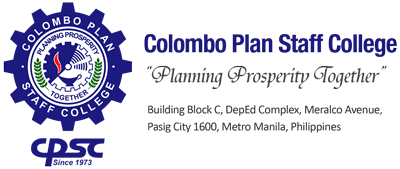
DATE: October 16 - 20, 2023 |
VENUE: Colombo Plan Staff College, Manila Philippines |
ORGANIZERS: Colombo Plan Staff College (CPSC) andAsian Development Bank (ADB) |
Background
The Technical and Vocational Education and Training (TVET) sector plays a crucial role in preparing individuals for the workforce and contributing to economic growth and societal development. As the world enters a new era characterized by rapid digitalization and escalating climate challenges, the need to empower the TVET sector with relevant skills becomes more pressing than ever. This comprehensive background delves into the imperative of merging digitalization and climate resilience in the TVET sector to achieve sustainable development, ensuring that learners are equipped to thrive in the dynamic landscape of the future. That’s why we can state that the Digitalization Era has revolutionized virtually every aspect of modern life, profoundly impacting economies, industries, and societies. It has redefined how businesses operate, how information is disseminated, and how individuals interact with each other and their environment. As the Fourth Industrial Revolution unfolds, automation, artificial intelligence, big data, and the Internet of Things (IoT) have become driving forces of change. Consequently, digital skills have become indispensable for the workforce, with demand soaring across various sectors. However, despite the transformative potential of digitalization, a significant digital divide persists, leaving many communities marginalized and excluded from the benefits of the digital revolution.
It is very important to understand the need for digital literacy and skills pervasive influence of digital technologies. There is an urgent need to promote digital literacy and skills across all levels of society. The TVET sector, with its focus on practical and job-oriented training, has a pivotal role in addressing this challenge. By integrating digital literacy into its curriculum, the TVET sector can equip learners with essential skills, such as computer proficiency, coding, data analysis, digital marketing, and cybersecurity. This prepares individuals for the digital workforce and opens doors to new opportunities for socioeconomic advancement. Moreover, emphasizing digital skills for marginalized communities can bridge the digital divide and promote inclusive growth. But in the present Scenario a climate change poses one of the most significant threats to human and social development in the 21st century. The escalating frequency and intensity of natural disasters, rising sea levels, extreme weather events, and ecological disruptions are causing profound socio-economic consequences. To mitigate and adapt to these challenges, the TVET sector must embrace climate resilience. Climate resilient skills encompass a wide array of practices, including sustainable agriculture, renewable energy technologies, eco-friendly construction, waste management, and conservation. Integrating climate resilience into the TVET curriculum empowers learners to become change agents, capable of addressing environmental challenges while promoting sustainable development.
Sustainable development lies at the heart of the global agenda, as articulated in the United Nations Sustainable Development Goals (SDGs). The TVET sector has a unique opportunity to contribute to the achievement of these goals by empowering learners with the skills required to build a sustainable future. By adopting a holistic approach that integrates digitalization and climate resilience, the TVET sector can foster sustainable development across multiple dimensions. For instance, by nurturing green skills, TVET institutions can support the transition to a low-carbon economy, reduce carbon footprints, and conserve natural resources. Therefore, to ensure the relevance and effectiveness of TVET programs, a community-centric approach is essential. This approach involves engaging local communities, industries, and stakeholders to identify specific needs and challenges. By understanding the unique socio-economic and environmental context of a region, TVET institutions can tailor their programs accordingly. A community-centric approach fosters ownership, collaboration, and sustainable impact. It empowers communities to take charge of their development, ensuring that the TVET sector contributes directly to local needs and aspirations.
Amidst the digital transformation and climate change, innovation and entrepreneurship emerge as key drivers of progress. The TVET sector can play a pivotal role in nurturing innovation by encouraging creativity, critical thinking, and problem-solving among learners. By providing opportunities for hands-on projects, internships, and industry collaborations, TVET institutions can incubate innovative solutions to real-world challenges. Furthermore, fostering an entrepreneurial spirit equips learners with the mindset and skills to launch their ventures, contributing to economic growth and job creation. In the pursuit of empowering the TVET sector, inclusivity and diversity should remain fundamental principles. Education should be accessible to all, regardless of gender, ethnicity, socio-economic status, or geographic location. By promoting gender equity and social inclusion in TVET programs, we can break down barriers and unlock the potential of marginalized individuals. This inclusive approach strengthens the workforce by tapping into diverse talents and perspectives, enriching society as a whole.
In conclusion, the empowerment of the TVET sector through digitalization and climate resilient skills is a critical undertaking for achieving sustainable development. By bridging the digital divide, fostering climate resilience, promoting sustainable practices, adopting a community-centric approach, and nurturing innovation and inclusivity, TVET institutions can prepare learners to thrive in the digital age while contributing to a greener and more equitable world. As we embrace this transformative journey, let us recognize the potential of the TVET sector to shape a brighter future for individuals, communities, and our planet. Thus, CPSC in collaboration with ADB is organizing this Special Regional program to impart necessary concepts, integration processes, and guidelines to incorporate the very essential components in the design to share comprehensive knowledge and good practices of the world in Empowering TVET Sector through Digitalization and Climate Resilient Skills for Sustainable Development.
Objectives
At the end of the program, participants should be able to:
- Understand the integration of digital literacy into the latest TVET trends to empower diverse learners with essential digital skills for active participation in the digital economy.
- Emphasize climate resilient skills and green technologies in TVET programs to prepare learners for environmental sustainability and climate challenges.
- Examine the integration of sustainability principles across all TVET disciplines to foster environmentally conscious practices.
- Explore the collaboration with industries to design TVET programs that equip learners with relevant digital skills for enhanced employability.
- Comprehend the new era state-of-the-art Digital Skills Academies which are providing comprehensive digital training and competence development.
- Observe specialized centers for hands-on training in sustainable practices, renewable energy, and climate resilience.
- Promote an entrepreneurial culture in the TVET sector by offering courses and workshops on innovation and business development.
- Explore a community-centric approach to tailor TVET programs to address region-specific challenges and promote positive impact.
- Understand the benefits of providing equal opportunities for all learners, promoting gender equity and social inclusion within the TVET sector.
- Examine Data-driven mechanisms to explore the program impact, enabling continuous adaptation and relevance in Country perspective.
Expected Output and Outcomes
The expected output of the program are:
- Identified TVET program’s funding issues and challenges in addressing weaknesses such as outdated curriculum, teaching methods and acquisition of new technologies & innovation in teaching.
- Importance of establishing partnership with industry
- Benefits of regularly conducting SWOT analysis
- Charted new directions & improve the quality of education by harnessing the potential of digital transformation.
- Action plan created to improve the skills & technological gaps within existing system through SWOT Analysis
- Understand the impact of investment in the TVET sector through multi-disciplinary approaches and connecting different sectors such as creative industry, clean energy and e-mobility.
The Participants are expected to gain more knowledge, experience and enhance the capacity of TVET leaders to understand and explore good practices of the world in Empowering TVET Sector through Digitalization and Climate Resilient Skills for Sustainable Development.
Program/Conference Strategies
Presentations on:
- Special Lecture 1: TVET Institutes Management for Global Competitiveness
10th ADB International Skills Forum
- A new Era of Digitalized and Climate Resilient Human and Social Development
Exercises and workshops on the following:
- SWOT Analysis for 21st Century
- Country based Challenges Presentations based on Conference Topics
Participants' Profile
The participants can be Principals, Administrators, Directors of TVET Authority or Education Ministry Senior Officers.
Date and Venue
The five-day program will be held from October 16-20, 2023 at Colombo Plan staff College (CPSC) and Asian Development Bank (ADB) headquarters in Manila Philippines.
Facilities Requirements
To conduct the program smoothly, the following facilities are required:
- Laptop computers (preferably participants to bring their own laptop)
- Internet Connection (LAN/WAN)
- Audio and Video Equipment
- Multimedia Projector and Projection Screen
- Flipcharts and large papers (for brainstorming activities)
Program Management and Resource Persons
|
|
|
|
|
|
Program Schedule













